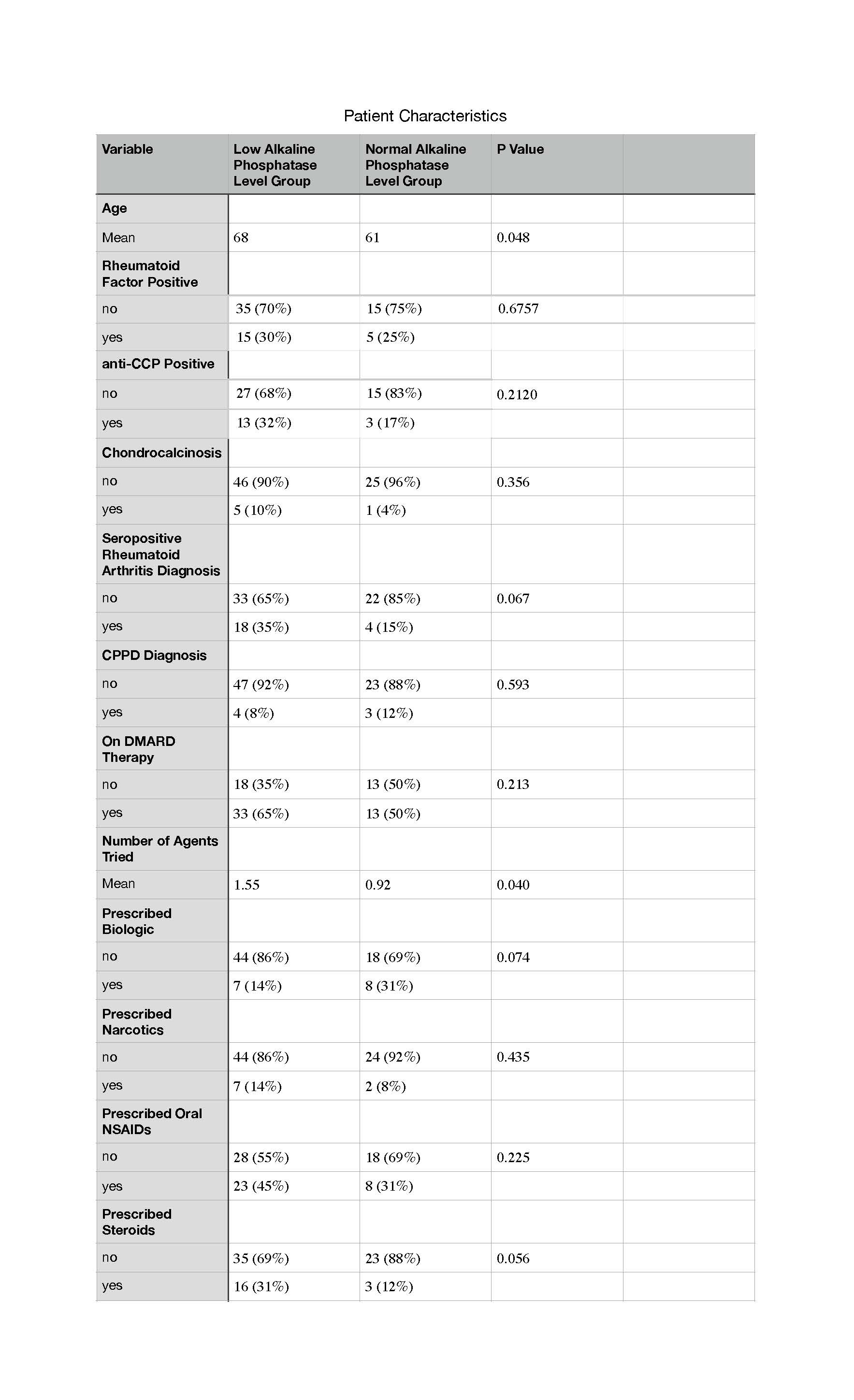Session Information
Session Type: Poster Session (Sunday)
Session Time: 9:00AM-11:00AM
Background/Purpose: Background: The biochemical hallmark of hypophosphatasia (HPP) is a low alkaline phosphatase (ALP) level. It is recognized that some forms of HPP present in adulthood and have been associated with common signs and symptoms seen in patients with rheumatic disease, including fatigue, muscle pain, weakness, bone pain, recurrent fracture, joint dislocation, and chondrocalcinosis1. The clinical implications of low ALP levels in patients with inflammatory arthritis is not well established.
Purpose: To analyze the clinical features associated with low ALP in patients with inflammatory arthritis in a rheumatology clinic.
Methods: Methods: This single center cross-sectional retrospective chart review of patients with low ALP levels and inflammatory arthritis, defined as rheumatoid arthritis (RA) or inflammatory arthritis encounter diagnoses, was performed using the VA electronic medical record. Patients with two or more ALP levels below 40 U/L were compared to patients with consistently normal ALP levels. We excluded patients with co-morbid disease and medications known to cause low ALP levels. The age, race, rheumatoid factor, anti-citrullinated peptide (anti-CCP) of these two groups were extracted. We looked at the bivariate relationships of these variables, comparing each separately in relation to the group. Clinical diagnoses and pharmacologic history of disease modifying agents and analgesics were extracted and compared between the two groups. Two Sample T test and Pearson’s Chi-Square test were used to compare population means and binary variables, respectively.
Results: Results: There was no significant difference in the prevalence of seropositivity or in clinical diagnoses between the two groups, however there was a trend towards patients with low ALP levels having seropositive RA (35% vs 15%, p=0.064). The mean number of disease modifying anti-rheumatic drugs tried was greater in the low ALP group than the control group (1.55 vs 0.92, p= 0.040). Patients in the low ALP group were also older (68 vs 61, p= 0.048). There was no difference in analgesic use between the two groups.
Conclusion: Conclusion: Patients with low ALP and inflammatory arthritis were older and had been tried on a greater number of DMARDs. These findings may suggest that these patients represent a cohort who have disease that is more severe or longstanding. There was no difference in prevalence of seropositive RA or seronegative RA in patients with low ALP levels. However, we did see a trend towards patients with low ALP having seropositive RA. Future work could evaluate for a stronger association between low ALP, RA, gout, pseudogout, and atypical forms of osteoarthritis using a larger sample size to detect this difference.
- Lefever, E. et al. Hypophosphatasia in Adults: Clinical Spectrum and Its Association With Genetics and Metabolic Substrates. Journal of Clinical Densitometry. https://doi.org/10.1016/j.jocd.2018.12.006
To cite this abstract in AMA style:
Monteagudo L, Gravely A, Valen P, Ewart D. The Clinical Characteristics of Patients with Inflammatory Arthritis and a Persistently Low Alkaline Phosphatase Level in a Veteran Affairs Rheumatology Clinic [abstract]. Arthritis Rheumatol. 2019; 71 (suppl 10). https://acrabstracts.org/abstract/the-clinical-characteristics-of-patients-with-inflammatory-arthritis-and-a-persistently-low-alkaline-phosphatase-level-in-a-veteran-affairs-rheumatology-clinic/. Accessed .« Back to 2019 ACR/ARP Annual Meeting
ACR Meeting Abstracts - https://acrabstracts.org/abstract/the-clinical-characteristics-of-patients-with-inflammatory-arthritis-and-a-persistently-low-alkaline-phosphatase-level-in-a-veteran-affairs-rheumatology-clinic/


